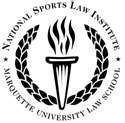 I had the privilege of working with three exceptionally fine teams this year: our two National Moot Court Competition teams and our Spong Tournament team. Two teams advanced to the quarter-final round of their respective competitions, and one team earned especially high oral argument scores.
I had the privilege of working with three exceptionally fine teams this year: our two National Moot Court Competition teams and our Spong Tournament team. Two teams advanced to the quarter-final round of their respective competitions, and one team earned especially high oral argument scores.
Today the Marquette team advanced to the quarter-finals of the 2012 William B. Spong Moot Court Tournament at William & Mary School of Law. Please congratulate team members Dieter Juedes, Joseph Gorndt, and John Shanahan. The team placed within the top 8 of 26 teams who were invited to participate in the competition. Attorney Nicole Nellessen was the team’s practitioner coach. Alum Cliff Steele came here from Florida to brave several weeks of our Wisconsin winter to assist in oral argument preparation. Thank you to both.
 Yesterday I wrote that the Marquette moot court team was a quarter-finalist at the Spong Invitational Tournament at William & Mary School of Law. Since then, the team learned that one of its team members, Dieter Juedes, won the distinction of second best oralist for the entire competition. Congratulations to Dieter on this accomplishment.
Yesterday I wrote that the Marquette moot court team was a quarter-finalist at the Spong Invitational Tournament at William & Mary School of Law. Since then, the team learned that one of its team members, Dieter Juedes, won the distinction of second best oralist for the entire competition. Congratulations to Dieter on this accomplishment.

